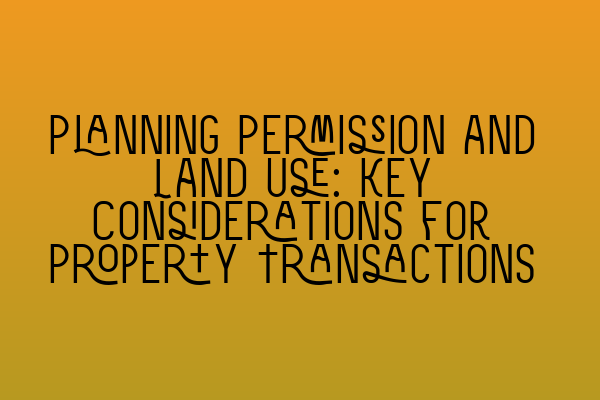Planning Permission and Land Use: Key Considerations for Property Transactions
When it comes to buying or selling property, one important aspect that cannot be overlooked is planning permission and land use. Understanding the regulations and restrictions surrounding land use can significantly impact the success of a property transaction. It is therefore crucial for both buyers and sellers to have a comprehensive understanding of the planning permission requirements and considerations. In this article, we will explore the key considerations related to planning permission and land use to ensure a smooth property transaction.
1. What is Planning Permission?
Planning permission is the authorization granted by the local planning authority (LPA) for specific types of development or changes in land use. It ensures that any proposed changes to a property align with the local development plan and adhere to certain standards. Without planning permission, certain developments may be considered illegal. It is essential to check whether the property in question has the necessary planning permission for its current use or any intended future use.
2. Types of Planning Permission
There are several types of planning permission that can be sought, depending on the nature and scale of the proposed development. These include:
– Full Planning Permission: This is the most common type of permission sought for a wide range of developments, such as building a new house or commercial property, changing the use of an existing property, or extending an existing property.
– Outline Planning Permission: This provides an initial assessment of the suitability of a development on a specific site, without going into detail about the design or layout.
– Reserved Matters Planning Permission: This is required if outline planning permission has been granted and further details regarding specific aspects of the development need to be addressed, such as appearance, landscaping, or layout.
– Listed Building Consent: If the property in question is a listed building, additional planning permission called Listed Building Consent is required for any alterations or modifications that may affect its character or historical significance.
3. Local Development Plans
Local development plans outline the vision, goals, and policies set by the local planning authority for the development in their area. It is essential to review the local development plan to understand the land use policies in the specific locality. This will help determine whether the proposed use of a property aligns with the local development plan and the chances of obtaining planning permission.
To ensure your property transaction goes smoothly, it is crucial to engage with a solicitor who has experience in property law and can navigate the complexities surrounding planning permission and land use. At SQE Property Law & Land Law, our team of expert solicitors can guide you through the intricacies of planning permission and provide you with the necessary advice to make informed decisions.
4. Change of Use
When considering a change of use for a property, it is important to note that planning permission may be required. Certain changes of use fall under Permitted Development Rights, allowing for the change of use without the need for specific planning permission. However, it is always advisable to verify with the local planning authority to ensure compliance with regulations.
5. Environmental Considerations
In addition to planning permission, property transactions should also consider environmental factors. Environmental Impact Assessments (EIAs) may be required for certain types of developments or changes in land use. These assessments evaluate the potential impact of the development on the surrounding environment and ensure appropriate measures are taken to mitigate any adverse effects.
6. Undertaking Due Diligence
Before entering into a property transaction, it is crucial to conduct thorough due diligence and obtain all relevant information regarding planning permission and land use. This includes reviewing planning documents, obtaining planning history, and assessing any potential restrictions or enforcement notices. A solicitor can assist in undertaking comprehensive due diligence to protect your interests.
7. Consulting with Professionals
To navigate the intricacies of planning permission and land use effectively, it is advisable to consult with professionals such as solicitors, surveyors, and architects. These experts can provide valuable advice and insights to ensure compliance with regulations and avoid any potential pitfalls.
Conclusion
Planning permission and land use considerations play a vital role in property transactions. Whether you are buying or selling a property, it is crucial to understand the regulations and restrictions surrounding planning permission and land use. Undertaking due diligence, reviewing local development plans, and consulting with professionals can help you navigate these complexities and ensure a successful property transaction.
For practice exam questions related to property law and land law, check out our SQE 1 Practice Exam Questions. To further prepare for the SQE exams, explore our SQE 1 Practice Mocks FLK1 FLK2 and consider our SQE 2 Preparation Courses and SQE 1 Preparation Courses. And if you’re looking for important dates relating to the SRA SQE exams, refer to our SRA SQE Exam Dates page.
